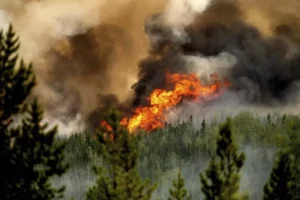Fire burns close to a highway near Sorrento, British Columbia, Canada, on Aug. 18, 2023, in this screen grab obtained from social media video. (Nikki Goyer via REUTERS)
The massive fires affecting Canada forced authorities to evacuate a town in the Far North on Friday, August 18. They are threatening a region in British Columbia, 2,000 km away. A state of emergency has been declared there.
“The situation is unpredictable at the moment, and difficult days await us,” said David Eby, the Premier of British Columbia (west), on the evening of Friday, August 18.

In the far north of the country, the 20,000 residents of the town of Yellowknife had until noon on Friday to leave. It was a race against time, as the capital of the Northwest Territories is very isolated. Some evacuees arrived Friday evening at Calgary Airport, carrying small bags, sometimes with a pet. “I feel lost, I have no idea what will happen now,” worried Byron Garrison, a 27-year-old construction worker, accompanied by his girlfriend and a friend, all visibly frightened.
Refugees from the Far North are welcomed into a small room to be registered and distributed to hotels. Fruits, cookies, and water are available to them. Dogs also have their supplies. “The government told us: we have to leave. So my wife and I took a few clothes and Rosy (editor’s note: their dog),” said Richard Manubag, a 53-year-old café employee from Yellowknife. “I’m sad. I’m thinking about everything I have in my house, and I don’t know what will happen. This is my only home, you understand?” Like others, he hopes to only have to stay in Calgary for “three or four days.”
Over a thousand fires
An evacuation pilot, Chad Blewett, explained to CBC that Yellowknife, where the military is mobilized, is now “rather empty.” The majority of evacuations took place by road. About 4,000 people chose to travel by air, according to authorities.
Canadian Prime Minister Justin Trudeau visited Edmonton on Friday evening, about 1,000 km from Yellowknife. He met with evacuees from the North at a reception center. In front of the press, he assured, “We will all get through this incredibly difficult summer together.”
He also mentioned “uncertain and frightening times” as over a thousand fires currently ravage the country from east to west. Over 230 are active in the Northwest Territories and over 370 in British Columbia.
“The equivalent of 100 years of fires in one night”
In this latter province, about 15,000 residents of the region are now affected by an evacuation order. Its executive leader, David Ebby, declared a state of emergency on Friday evening. The fires are particularly affecting West Kelowna (with over 30,000 residents), where “a significant number” of houses have burned, according to authorities, and where some areas have already been ordered to evacuate. The fire has spread over 6,800 hectares in 24 hours in this area. About 2,500 buildings have been evacuated, and another 5,000 could be.
The situation is also critical on the other side of Okanagan Lake, in Kelowna (about 150,000 residents). The airspace in the region has been closed to assist firefighting efforts. On Friday, the fire chief of West Kelowna, Jason Brolund, acknowledged that the previous night had “probably been one of the toughest of (his) career. We fought the equivalent of 100 years of fires, all in one night.” “Every effort has been made to mitigate the impact of the fire. But in the end, Mother Nature was too strong,” acknowledged a local official from Kelowna, Loyal Wooldridge. “Unfortunately, we are not out of danger.”
Thousands of people forced to flee as Kelowna wildfire grows 6 times overnight. State of emergency declared, evacuations ordered #BritishColumbia#Wildfire #WestKelowna #EastKelowna #Okanagan #McDougallCreek #OkanaganLake #Kelowna #TradersCove #BCwildfire #BCfire #Breaking… pic.twitter.com/xODm18JRCS
— Earth42morrow (@Earth42morrow) August 18, 2023
In recent years, Canada has faced extreme weather events whose intensity and frequency are increased by climate change. This year, the country is experiencing a record-breaking wildfire season: 168,000 Canadians have been evacuated across the country, and 14 million hectares – approximately the size of Greece – have burned, double the previous record set in 1989.
